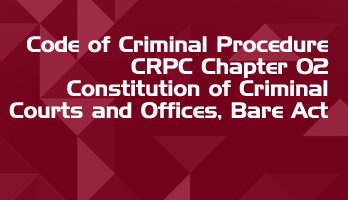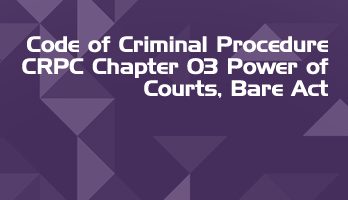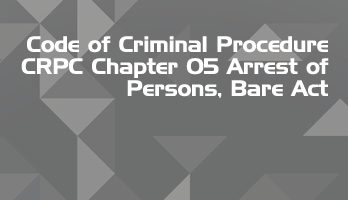A 'Bare act' is the actual legislation passed by the Parliament of India. Generally, an act sets out the high level legal and policy principles applicable to the subject matter of the law.
Most acts are accompanied by 'subsidiary legislation' such as rules, regulations, notifications and orders; which address the actual implementation detail of the act.
Free Full Course Available on LawMint's YouTube Channel
How to Land Your Dream LLB Internship in a Top Law Firm
- Part 1 - Introduction
- Part 2 - Internship Planning
- Part 3 - Internship Research
- Part 4 - Building Your Profile
- Part 5 - The Email
- Part 6 - The Resume
- Part 7 - The Cover Letter
- Part 8 - The Interview
- Part 9 - Self Development
Practical and comprehensive course, with real examples and step-by-step analysis of the complete internship application process. Check out LawMint's YouTube channel now!
Code of Criminal Procedure, 1973
Preamble
An Act to consolidate and amend the law relating to Criminal Procedure. BE it enacted by Parliament in the Twenty – fourth Year of the Republic of India as follows:
Chapter 1 – Preliminary
Section 1 – Short title, extent and commencement
- This Act may be called the Code of Criminal Procedure, 1973.
- It extends to the whole of India except the State of Jammu and Kashmir: Provided that the provisions of this Code, other than those relating to Chapters VIII, X and XI thereof, shall not apply –
- to the State of Nagaland,
- to the tribal areas but the concerned State Government may, by notification apply such provisions or any of them to the whole or part of the State of Nagaland or such tribal areas, as the case may be, with such supplemental, incidental or consequential modifications, as may be specified in the notification. Explanation – In this section, “tribal areas” means the territories which immediately before the 21st day of January, 1972, were included in the tribal areas of Assam, as referred to in paragraph 20 of the Sixth Schedule to the Constitution, other than those within the local limits of the municipality of Shillong.
- It shall come into force on the 1st day of April, 1974.
Section 2 – Definitions
In this Code, unless the context otherwise requires, –
- “bailable offence” means an offence which is shown as bailable in the First Schedule, or which is made bailable by any other law for the time being in force; and “non – bailable offence” means any other offence;
- “charge” includes any head of charge when the charge contains more heads than one;
- “cognizable offence” means an offence for which, and “cognizable case” means a case in which, a police officer may, in accordance with the First Schedule or under any other law for the time being in force, arrest without warrant;
- “complaint” means any allegation made orally or in writing to a Magistrate, with a view to his taking action under this Code, that some person, whether known or unknown, has committed an offence, but does not include a police report. Explanation – A report made by a police officer in a case which discloses, after investigation, the commission of a non – cognizable offence shall be deemed to be a complaint; and the police officer by whom such report is made shall be deemed to be the complainant;
- “High Court” means, –
- in relation to any Stale, the High Court for that State;
- in relation to a Union territory to which the jurisdiction of the High Court for a State has been extended by law, that High Court;
- in relation to any other Union territory, the highest Court of criminal appeal for that territory other than the Supreme Court of India;
- “India” means the territories to which this Code extends;
- “inquiry” means every inquiry, other than a trial, conducted under this Code by a Magistrate or Court;
- “investigation” includes all the proceedings under this Code for the collection of evidence conducted by a police officer or by any person other than a Magistrate who is authorised by a Magistrate in this behalf;
- “judicial proceeding” includes any proceeding in the course of which evidence is or may be legally taken on oath;
- “local jurisdiction”, in relation to a Court or Magistrate, means the local area within which the Court or Magistrate may exercise all or any of its or his powers under this Code and such local area may comprise the whole of the State, or any part of the State, as the State Government may, by notification, specify;
- “metropolitan area” means the area declared, or deemed to be declared, under section 8, to be a metropolitan area;
- “non – cognizable offence” means an offence for which, and “non – cognizable case” means a case in which, a police officer has no authority to arrest without warrant;
- “notification” means a notification published in the Official Gazette;
- “offence” means any act or omission made punishable by any law for the time being in force and includes any act in respect of which a complaint may be made under section 20 of the Cattle – trespass Act, 1871 (1 of 1871);
- “officer in charge of a police station” includes, when the officer in charge of the police station is absent from the station – house or unable from illness or other cause to perform his duties, the police officer present at the station – house who is next in rank to such officer and is above the rank of constable or, when, the State Government so directs, any other police officer so present;
- “place” includes a house, building, tent, vehicle and vessel;
- “pleader”, when used with reference to any proceeding in any Court, means a person authorised by or under any law for the time being in force, to practise in such Court, and includes any other appointed with the permission of the Court to act in such proceeding;
- “police report” means a report forwarded by a police officer to a Magistrate under Sub – Section (2) of section 173;
- “police station” means any post or place declared generally or specially by the State Government, to be a police station, and includes any local area specified by the State Government in this behalf;
- “prescribed” means prescribed by rules made under this Code;
- “Public Prosecutor” means any person appointed under section 24, and includes any person acting under the directions of a Public Prosecutor;
- “sub – division” means a sub – division of a district;
- “summons – case” means a case relating to an offence, and not being a warrant – case; (wa) “victim” means a person who has suffered any loss or injury caused by reason of the act or omission for which the accused person has been charged and the expression “victim” includes his or her guardian or legal heir;
- “warrant – case” means a case relating to an offence punishable with death, imprisonment for life or imprisonment for a term exceeding two years;
- words and expressions used herein and not defined but defined in the Indian Penal Code (45 of 1860) have the meanings respectively assigned to them in that Code.
Section 3 – Construction of references
- In this Code, –
- any reference, without any qualifying words, to a Magistrate shall be construed, unless the context otherwise requires, –
- in relation to an area outside a metropolitan area, as a reference to a Judicial Magistrate;
- in relation to a metropolitan area, as a reference to a Metropolitan Magistrate;
- any reference to a Magistrate of the second class shall, in relation to an area outside a metropolitan area, be construed as a reference to a Judicial Magistrate of the second class, and, in relation to a Metropolitan area, as a reference to a Metropolitan Magistrate;
- any reference to a Magistrate of the first class shall, –
- in relation to a Metropolitan area, be construed as a reference to a Metropolitan Magistrate exercising jurisdiction in that area;
- in relation to any other area, be construed as a reference to a Judicial Magistrate of the first class exercising jurisdiction in that area;
- any reference to the Chief Judicial Magistrate shall, in relation to a Metropolitan area, be construed as a reference to the Chief Metropolitan Magistrate exercising jurisdiction in that area.
- any reference, without any qualifying words, to a Magistrate shall be construed, unless the context otherwise requires, –
- In this Code, unless the context otherwise requires, any reference to the Court of a Judicial Magistrate shall, in relation to a Metropolitan area, be construed as a reference to the Court of the Metropolitan Magistrate for that area.
- Unless the context otherwise requires, any reference in any enactment passed before the commencement of this Code. –
- to a Magistrate of the first class, shall be construed as a reference to a Judicial Magistrate of the first class;
- to a Magistrate of the second class or of the third class, shall be construed as a reference to a Judicial Magistrate of the second class;
- to a Presidency Magistrate or Chief Presidency Magistrate, shall be construed as a reference, respectively, to a Metropolitan magistrate or the Chief Metropolitan Magistrate;
- to any area which is included in a metropolitan area, as a reference to such metropolitan area, and any reference to a Magistrate of the first class or of the second class in relation to such area, shall be construed as a reference to the Metropolitan Magistrate exercising jurisdiction in such area.
- Where, under any law, other than this Code, the functions exercisable by a Magistrate relate to matters –
- which involve the appreciation or shifting of evidence or the formulation of any decision which exposes any person to any punishment or penalty or detention in custody pending investigation, inquiry or trial or would have the effect of sending him for trial before any Court, they shall, subject to the provisions of this Code, be exercisable by a Judicial Magistrate; or
- which are administrative or executive in nature, such as, the granting of a licence, the suspension or cancellation of a licence, sanctioning a prosecution or withdrawing from a prosecution, they shall, subject as aforesaid, be exercisable by an Executive Magistrate.
Section 4 – Trial of offences under the Indian Penal Code and other laws
- All offences under the Indian Penal Code (45 of 1860) shall be investigated, inquired into, tried, and otherwise dealt with according to the provisions hereinafter contained.
- All offences under any other law shall be investigated, inquired into, tried, and otherwise dealt with according to the same provisions, but subject to any enactment for the lime being in force regulating the manner or place of investigating, inquiring into, trying or otherwise dealing with such offences.
Section 5 – Saving
Nothing contained in this Code shall, in the absence of a specific provision to the contrary, affect any special or local law for the time being in force, or any special jurisdiction or power conferred, or any special form of procedure prescribed, by any other law for the time being in force.
Important Central Acts in Regional Languages
Legislative department website also features regional language versions of several important Central Acts.
Free Full Course Available on LawMint's YouTube Channel
How to Land Your Dream LLB Internship in a Top Law Firm
- Part 1 - Introduction
- Part 2 - Internship Planning
- Part 3 - Internship Research
- Part 4 - Building Your Profile
- Part 5 - The Email
- Part 6 - The Resume
- Part 7 - The Cover Letter
- Part 8 - The Interview
- Part 9 - Self Development
Practical and comprehensive course, with real examples and step-by-step analysis of the complete internship application process. Check out LawMint's YouTube channel now!












